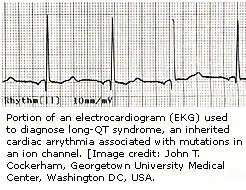
Long QT syndrome (LQTS) results from structural abnormalities in the potassium channels of the heart, which predispose affected persons to an accelerated heart rhythm (arrhythmia). This can lead to sudden loss of consciousness and may cause sudden cardiac death in teenagers and young adults who are faced with stressors ranging from exercise to loud sounds.
LQTS is usually inherited as an autosomal dominant trait. In the case of LQT1, which has been mapped to chromosome 11, mutations lead to serious structural defects in the person's cardiac potassium channels that do not allow proper transmission of the electrical impulses throughout the heart. There also appear to be other genes, tentatively located on chromosomes 3, 6 and 11 whose mutated products may contribute to, or cause, LQT syndrome.
Beta blockers are used to treat the symptoms of the disease, and appear to be effective in some symptomatic patients. However, common sense therapies such as avoiding strenuous physical exercise and other stressors are also effective. Research on how the genes discussed above interact with each other should encourage the development of new treatments for long-QT syndrome.
Related diseases
Publication Details
Copyright
Publisher
National Center for Biotechnology Information (US), Bethesda (MD)
NLM Citation
National Center for Biotechnology Information (US). Genes and Disease [Internet]. Bethesda (MD): National Center for Biotechnology Information (US); 1998-. Long QT syndrome.